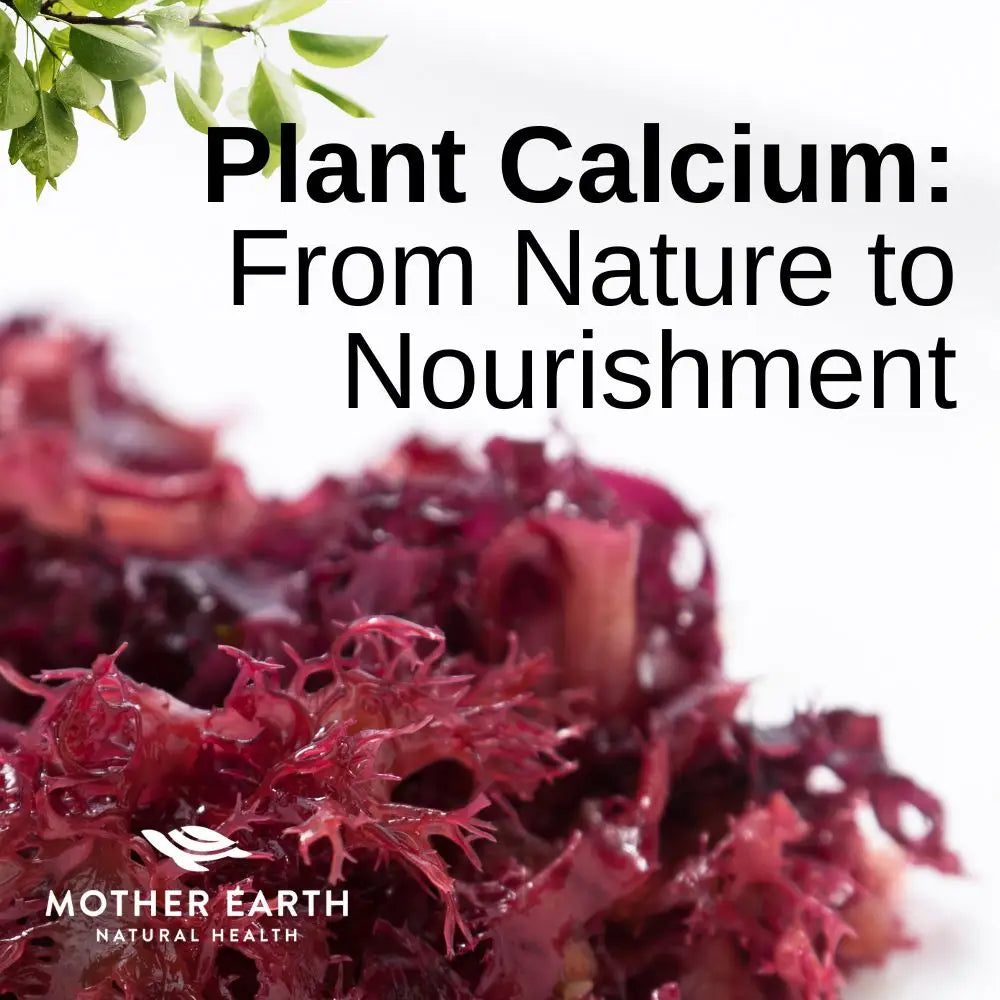What is plant calcium?

Plant calcium is a type of calcium that is derived from plants. It is a natural and organic form of calcium that is found in a variety of plant-based foods. Unlike calcium from animal sources, such as dairy products, plant calcium is more easily absorbed by the body. This means that it can provide the same benefits as other sources of calcium, but with the added advantage of being derived from plants.
Plant calcium is found in many different types of plants, including leafy greens like kale and spinach, as well as nuts and seeds like almonds and sesame seeds. It can also be found in fruits like oranges and figs. The calcium in these plants is in the form of calcium oxalate, which is easily absorbed by the body.
The benefits of plant calcium
Plant calcium offers a range of benefits for our overall health and well-being. One of the main benefits is its role in building and maintaining strong bones. Calcium is essential for bone health, and plant calcium provides a natural and effective way to ensure that our bones remain healthy and strong. It also helps to prevent conditions like osteoporosis, which is a common condition that causes bones to become weak and brittle.
In addition to its benefits for bone health, plant calcium also plays a vital role in maintaining a healthy heart. Studies have shown that a diet rich in plant calcium can help to lower blood pressure and reduce the risk of heart disease. This is because plant calcium helps to relax the blood vessels, allowing blood to flow more freely throughout the body. It also helps to prevent the buildup of plaque in the arteries, which can lead to heart disease.
Studies on plant calcium and its effectiveness
Numerous studies have been conducted to evaluate the effectiveness of plant calcium in promoting bone health and overall wellness. These studies have consistently shown that plant calcium is as effective as other sources of calcium in maintaining bone density and preventing bone loss. In fact, some studies have even suggested that plant calcium may be more beneficial than other sources, as it is more easily absorbed by the body.
One study published in the Journal of Bone and Mineral Research found that women who consumed higher amounts of plant calcium had a significantly lower risk of hip fractures compared to those who consumed lower amounts. Another study published in the American Journal of Clinical Nutrition found that a diet rich in plant calcium was associated with a reduced risk of developing osteoporosis.
These studies provide strong evidence that plant calcium is a valuable nutrient for promoting bone health and overall wellness. They also highlight the importance of incorporating plant-based foods into our diets to ensure that we are getting an adequate amount of calcium.
Comparing plant calcium to other sources of calcium
When it comes to getting enough calcium, many people turn to dairy products like milk and cheese. While dairy products are a good source of calcium, they are not the only option. Plant calcium offers a viable alternative that is just as effective, if not more so, in providing the calcium our bodies need.
One advantage of plant calcium is that it is more easily absorbed by the body. This means that we can get the same amount of calcium from plant-based foods as we would from dairy products, but with the added benefit of better absorption. Additionally, plant calcium is a more sustainable and ethical choice, as it does not require the use of animals or contribute to environmental degradation.
There are also many different plant-based foods that are rich in calcium, which provides a greater variety of options for those who may be lactose intolerant or following a vegan or vegetarian diet. Leafy greens, nuts, seeds, and certain fruits are all excellent sources of plant calcium, and can easily be incorporated into meals and snacks.
The role of plant calcium in bone health

Calcium is essential for the development and maintenance of strong bones, and plant calcium plays a crucial role in this process. When we consume plant-based foods that are rich in calcium, our bodies absorb the calcium and use it to build and repair bone tissue.
Plant calcium also helps to prevent the breakdown of bone tissue, which can occur as we age or due to certain medical conditions. By maintaining a healthy level of calcium in our bodies, we can help to prevent conditions like osteoporosis and reduce the risk of fractures and other bone-related injuries.
In addition to calcium, plant-based foods also provide other nutrients that are important for bone health, such as vitamin D, magnesium, and vitamin K. These nutrients work together to ensure that our bones remain strong and healthy throughout our lives.
Plant calcium and its impact on heart health
Not only does plant calcium benefit our bones, but it also has a positive impact on our heart health. High blood pressure is a major risk factor for heart disease, and plant calcium has been shown to help lower blood pressure and reduce the risk of developing heart disease.
Plant calcium helps to relax the blood vessels, which allows for better blood flow and reduces the strain on the heart. It also helps to prevent the buildup of plaque in the arteries, which can lead to atherosclerosis and other cardiovascular conditions.
Studies have consistently shown that a diet rich in plant calcium can help to lower blood pressure and reduce the risk of heart disease. In one study published in the Journal of the American Heart Association, researchers found that participants who consumed higher amounts of plant calcium had a significantly lower risk of developing heart disease compared to those who consumed lower amounts.
The uses of plant calcium in cooking and baking

Plant calcium not only provides numerous health benefits, but it can also be incorporated into a variety of delicious recipes. Many plant-based foods that are rich in calcium can be used in cooking and baking to add a boost of nutrition and flavor to your meals.
Leafy greens like kale and spinach can be sautéed or added to salads for a nutritious and calcium-rich side dish. Nuts and seeds like almonds and sesame seeds can be used in a variety of recipes, from smoothies and granola to baked goods like cookies and bread.
Fruits like oranges and figs can also be enjoyed on their own or used in recipes to add a natural sweetness and a dose of plant calcium. Incorporating these foods into your diet not only provides the calcium your body needs but also adds a delicious and nutritious element to your meals.
Plant calcium supplements and their effectiveness
While getting calcium from plant-based foods is the ideal way to ensure you are meeting your daily calcium needs, plant calcium supplements can also be a convenient option. These supplements are derived from plants and provide an easily absorbed form of calcium.
When choosing a plant calcium supplement, it is important to look for one that is made from organic and natural ingredients. It should also be free from any artificial additives or fillers. Additionally, it is always a good idea to consult with a healthcare professional before starting any new supplement regimen.
Studies have shown that plant calcium supplements can be just as effective as other forms of calcium in maintaining bone health. However, it is important to note that supplements should not replace a healthy diet rich in plant-based foods. They should be used as a complement to a balanced diet to ensure that you are getting an adequate amount of calcium.
Incorporating plant calcium into your diet
Incorporating plant calcium into your diet is easier than you might think. By making a few simple swaps and additions to your meals, you can increase your calcium intake and reap the benefits of this essential nutrient.
Start by incorporating more leafy greens into your meals. Add spinach to your morning smoothie or sauté kale as a side dish for dinner. Snack on almonds or sprinkle sesame seeds on top of your salads or stir-fries. Enjoy a fresh orange or fig as a mid-afternoon snack.
You can also experiment with plant-based calcium-rich recipes. Make a creamy almond milk from scratch or bake a batch of calcium-packed kale chips. There are countless ways to incorporate plant calcium into your diet, so get creative and have fun exploring new recipes and flavors.
Conclusion: The power of plant calcium for overall health and well-being
Plant calcium is a valuable nutrient that offers a range of benefits for our overall health and well-being. From promoting strong bones to supporting heart health, plant calcium plays a crucial role in maintaining our overall wellness.
Through numerous studies, plant calcium has been shown to be just as effective, if not more so, than other sources of calcium. It is easily absorbed by the body and provides a sustainable and ethical choice for those looking to incorporate more calcium into their diets.
By incorporating plant-based foods rich in calcium into our meals, we can ensure that we are getting an adequate amount of this essential nutrient. From leafy greens to nuts and seeds, there are many delicious and nutritious options to choose from.
So, why not make plant calcium a part of your daily routine? Your bones and heart will thank you for it.
CTA: Start incorporating more plant-based calcium-rich foods into your diet today and experience the many benefits for yourself.

